- Clone
- G043H7 (See other available formats)
- Regulatory Status
- RUO
- Other Names
- BLR2, CDw197, EBI1, CMKBR7
- Isotype
- Mouse IgG2a, κ
- Barcode Sequence
- AGTTCAGTCAACCGA
- Ave. Rating
- Submit a Review
| Cat # | Size | Price | Quantity Check Availability | Save | ||
|---|---|---|---|---|---|---|
| 353267 | 10 µg | $369 | ||||
CCR7, also known as CD197, is a chemokine receptor that binds CCL19 and CCL21. CCR7 and its ligands link innate and adaptive immunity by affecting interactions between T cells and dendritic cells and their downstream effect. Naïve T cells enter the lymph node through high endothelial venules, which express CCL21. Dendritic cells and macrophages enter the lymph node through afferent lymphatics. The encounter of T cells and dendritic cells in the T cell zone is CCR7-dependent. In addition, during immunological surveillance, B cells recirculate between B-cell-rich compartments (follicles or B cell zones) in secondary lymphoid organs, surveying for antigen. After antigen binding, B cells move to the boundary of B and T zones to interact with T-helper cells; this B cell migration is directed by CCR7 and its ligands. CCR7-positive cancer cell expression has been associated with lymph node metastasis.
Product DetailsProduct Details
- Verified Reactivity
- Human
- Reported Reactivity
- African Green, Baboon, Cynomolgus, Rhesus
- Antibody Type
- Monoclonal
- Host Species
- Mouse
- Immunogen
- CCR7-transfected cells
- Formulation
- Phosphate-buffered solution, pH 7.2, containing 0.09% sodium azide and EDTA
- Preparation
- The antibody was purified by chromatography and conjugated with TotalSeq™-D oligomer under optimal conditions.
- Concentration
- 0.5 mg/mL
- Storage & Handling
- The antibody solution should be stored undiluted between 2°C and 8°C. Do not freeze.
- Application
-
PG - Quality tested
- Recommended Usage
-
Each lot of this antibody is quality control tested by immunofluorescent staining with flow cytometric analysis and the oligomer sequence is confirmed by sequencing. TotalSeq™-D antibodies are compatible with Mission Bio’s Tapestri Single-Cell Sequencing Platform for simultaneous detection of DNA and Protein.
To maximize performance, it is strongly recommended that the reagent be titrated for each application, and that you centrifuge the antibody dilution before adding to the cells at 14,000xg at 2 - 8°C for 10 minutes. Carefully pipette out the liquid avoiding the bottom of the tube and add to the cell suspension. For Proteogenomics analysis, the suggested starting amount of this reagent for titration is ≤ 1.0 µg per million cells in 100 µL volume. Refer to the corresponding TotalSeq™ protocol for specific staining instructions.
Buyer is solely responsible for determining whether Buyer has all intellectual property rights that are necessary for Buyer's intended uses of the BioLegend TotalSeq™ products. For example, for any technology platform Buyer uses with TotalSeq™, it is Buyer's sole responsibility to determine whether it has all necessary third party intellectual property rights to use that platform and TotalSeq™ with that platform. - Additional Product Notes
-
TotalSeq™-D reagents are designed to profile protein expression at single cell level. The Mission Bio Tapestri platform and sequencer (e.g. Illumina analyzers) are required. Please contact technical support for more information, or visit biolegend.com/totalseq/single-cell-dna
The barcode flanking sequences are CGAGATGACTACGCTACTCATGG (PCR handle), and GAGCCGATCTAGTATCTCAGT*C*G (capture sequence). * indicates a phosphorothioated bond, to prevent nuclease degradation.
View more applications data for this product in our Application Technical Notes. - RRID
-
AB_2894573 (BioLegend Cat. No. 353267)
Antigen Details
- Structure
- Chemokine receptor, G protein-coupled receptors (GPCR), seven transmembrane receptor.
- Distribution
-
T cells, B cells, NK, dendritic cells.
- Function
- The chemokine receptor CCR7 plays a pivotal role in the homing of naïve T cells and regulatory T cells to secondary lymphoid organs, and the migration of dendritic cells into afferent lymphatic vessels.
- Ligand/Receptor
- CCL19 and CCL21.
- Cell Type
- B cells, Dendritic cells, NK cells, T cells
- Biology Area
- Immunology
- Molecular Family
- CD Molecules, Cytokine/Chemokine Receptors, GPCR
- Antigen References
-
1. Yanagihara S, et al. 1998. J. Immunol. 161:3096.
2. Charo IF, et al. 2006. N. Engl. J. Med. 354:610.
3. Reif K, et al. 2002. Nature 416:94.
4. Nakata B, et al. 2008. Oncology 74:69.
5. Brodie T. et al. 2013. Cytometry A. 6: 530-2. PubMed
6. Graves A.J. et al. 2014. Cytometry A. 7: 576–9 PubMed
7. Moncunill G. et al. 2014. Cytometry A. 12: 995-8 PubMed - Gene ID
- 1236 View all products for this Gene ID
- UniProt
- View information about CD197 on UniProt.org
Related FAQs
- Does staining at room temperature or even at 37°C help for checking chemokine receptors expression?
-
Due to continuous recycling of many chemokine receptors, it may be worthwhile to consider staining at room temperature or at 37°C if the staining at lower temperature (which can potentially reduce receptor turnover) is not optimal.
Other Formats
View All CD197 Reagents Request Custom ConjugationCompare Data Across All Formats
This data display is provided for general comparisons between formats.
Your actual data may vary due to variations in samples, target cells, instruments and their settings, staining conditions, and other factors.
If you need assistance with selecting the best format contact our expert technical support team.
-
Purified anti-human CD197 (CCR7)
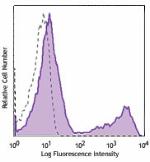
Human peripheral blood lymphocytes were stained with purifie... -
Alexa Fluor® 488 anti-human CD197 (CCR7)
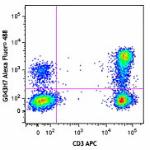
Human peripheral blood lymphocytes were stained with CD3 APC... 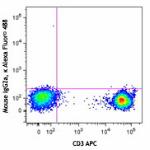
-
Brilliant Violet 421™ anti-human CD197 (CCR7)
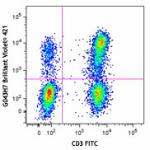
Human peripheral blood lymphocytes were stained with CD3 FIT... 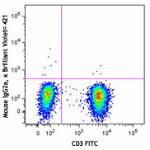
-
PE anti-human CD197 (CCR7)

Human peripheral blood lymphocytes were stained with CD3 APC... -
APC/Cyanine7 anti-human CD197 (CCR7)

Human peripheral blood lymphocytes were stained with CD3 FIT... -
Pacific Blue™ anti-human CD197 (CCR7)
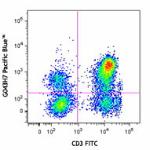
Human peripheral blood lymphocytes were stained with CD197 (... 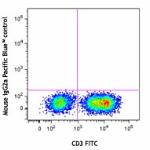
-
APC anti-human CD197 (CCR7)
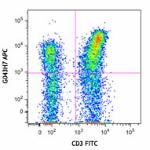
Human peripheral blood lymphocytes were stained with CD3 FIT... 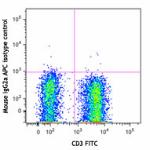
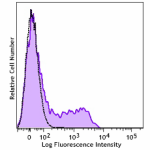
APC anti-human CD197 (CCR7) Antibody Cynomolgus monkey peri... 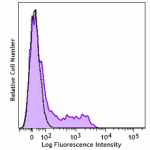
Rhesus macaque peripheral blood lymphocytes were stained wit... -
FITC anti-human CD197 (CCR7)
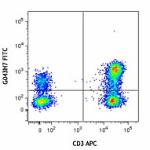
Human peripheral blood lymphocytes were stained with CD3 APC... 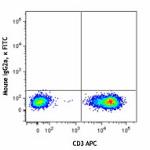
-
Alexa Fluor® 647 anti-human CD197 (CCR7)
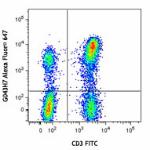
Human peripheral blood lymphocytes were stained with CD3 FIT... 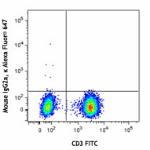
-
PerCP/Cyanine5.5 anti-human CD197 (CCR7)

Human peripheral blood leucocytes were stained with CD3 FITC... -
Brilliant Violet 605™ anti-human CD197 (CCR7)
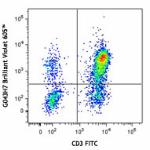
Human peripheral blood lymphocytes were stained with CD3 FIT... -
PE/Cyanine7 anti-human CD197 (CCR7)

Human peripheral blood lymphocytes were stained with CD3 FIT... -
Brilliant Violet 711™ anti-human CD197 (CCR7)
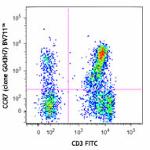
Human peripheral blood lymphocytes were stained with CD3 FIT... -
Brilliant Violet 785™ anti-human CD197 (CCR7)
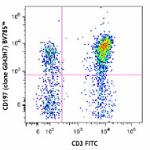
Human peripheral blood lymphocytes were stained with CD3 FIT... -
Brilliant Violet 510™ anti-human CD197 (CCR7)
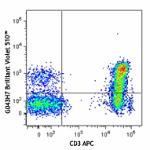
Human peripheral blood lymphocytes were stained with CD3 APC... 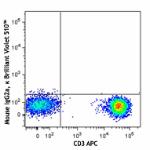
-
Brilliant Violet 650™ anti-human CD197 (CCR7)
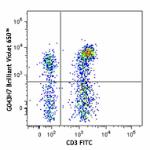
Human peripheral blood lymphocytes were stained with CD3 FIT... 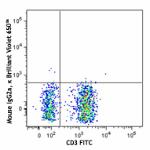
-
PE/Dazzle™ 594 anti-human CD197 (CCR7)
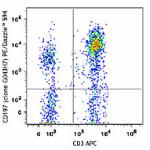
Human peripheral blood lymphocytes were stained with CD3 APC... 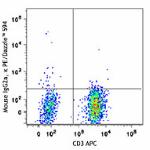
-
Biotin anti-human CD197 (CCR7)
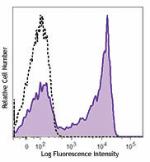
Human peripheral blood lymphocytes were stained with biotiny... -
Purified anti-human CD197 (CCR7) (Maxpar® Ready)
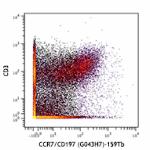
Human PBMCs stained with 170Er-anti-CD3 (UCHT1) and 159Tb-an... -
PerCP anti-human CD197 (CCR7)
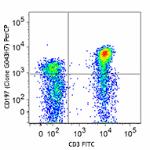
Human peripheral blood lymphocytes were stained with CD3 FIT... 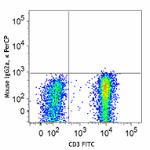
-
Alexa Fluor® 700 anti-human CD197 (CCR7)
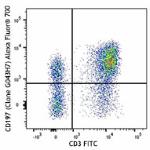
Human peripheral blood lymphocytes were stained with CD3 FIT... 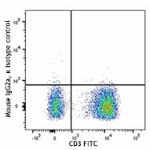
-
APC/Fire™ 750 anti-human CD197 (CCR7)

Human peripheral blood lymphocytes were stained with CD3 FIT... -
TotalSeq™-A0148 anti-human CD197 (CCR7)
-
TotalSeq™-B0148 anti-human CD197 (CCR7)
-
TotalSeq™-C0148 anti-human CD197 (CCR7)
-
Brilliant Violet 750™ anti-human CD197 (CCR7)

Human peripheral blood lymphocytes were stained with CD3 FIT... -
Ultra-LEAF™ Purified anti-human CD197 (CCR7)
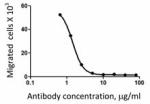
Chemotaxis of human CCR7-transfected BaF3 cells was performe... -
Spark NIR™ 685 anti-human CD197 (CCR7)

Human peripheral blood lymphocytes were stained with CD3 FIT... -
KIRAVIA Blue 520™ anti-human CD197 (CCR7)

Human peripheral blood lymphocytes were stained with CD3 APC... -
PE/Fire™ 640 anti-human CD197 (CCR7)

Human peripheral blood lymphocytes were stained with CD3 FIT... -
Spark YG™ 581 anti-human CD197 (CCR7)

Human peripheral blood lymphocytes were stained with anti-hu... -
APC/Fire™ 810 anti-human CD197 (CCR7) Antibody

Human peripheral blood lymphocytes were stained with anti-hu... -
TotalSeq™-D0148 anti-human CD197 (CCR7)
-
PE/Fire™ 810 anti-human CD197 (CCR7) Antibody

Human peripheral blood lymphocytes were stained with anti-hu... -
PE/Cyanine5 anti-human CD197 (CCR7)

Human peripheral blood lymphocytes were stained with CD3 FIT... -
Spark YG™ 593 anti-human CD197 (CCR7)

Human peripheral blood lymphocytes were stained with anti-hu... -
PE/Fire™ 744 anti-human CD197 (CCR7)

Human peripheral blood lymphocytes were stained with anti-hu... -
Spark Red™ 718 anti-human CD197 (CCR7)

Human peripheral blood lymphocytes were stained with anti-hu... -
PE anti-human CD197

Typical results from human peripheral blood lymphocytes stai... -
Spark PLUS UV395™ anti-human CD197 (CCR7)

Human peripheral blood lymphocytes were stained with anti-hu... -
PerCP/Fire™ 780 anti-human CD197 (CCR7)

Human peripheral blood lymphocytes were stained with anti-hu... -
Brilliant Violet 570™ anti-human CD197 (CCR7) Antibody

Human peripheral blood lymphocytes were stained with anti-hu...

 Login/Register
Login/Register 

















Follow Us